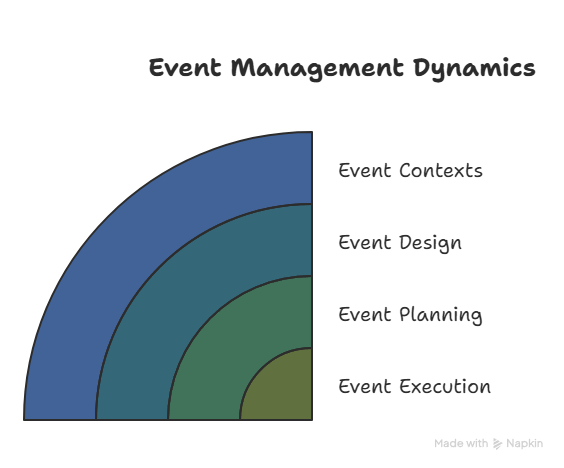Event Management: Your Ultimate Guide to Crafting Unforgettable Experiences
Event management transforms ordinary gatherings into extraordinary moments, blending creativity, strategy, and precise execution to deliver memorable experiences for clients and attendees.
Key Takeaways:
- Comprehensive planning is crucial
- Technology enhances event delivery
- Flexibility ensures success
- Client satisfaction drives excellence
Understanding Event Management
Event management is a dynamic profession that involves designing, planning, and executing events across various contexts. From intimate corporate meetings to large-scale social gatherings, professional event managers orchestrate experiences that leave lasting impressions.

Types of Events
- Corporate Events
- Conferences
- Product Launches
- Team Building
- Social Gatherings
- Weddings
- Birthday Parties
- Anniversaries
- Virtual and Hybrid Events
- Online Webinars
- Dual-Format Conferences
- Specialized Niche Events
- Non-Profit Fundraisers
- Industry-Specific Symposiums
The Event Management Process
Our streamlined six-step approach ensures smooth event execution:
- Initial Inquiry: Clients share their event vision
- Pre-Production Research: Detailed planning begins
- Event Walkthrough: Collaborative strategy session
- Cost Quotation: Transparent budget presentation
- Event Production: Turning plans into reality
- Event Delivery: Flawless execution
Technology Integration
Modern event management leverages cutting-edge digital tools:
| Technology | Purpose |
|---|---|
| Registration Platforms | Streamline attendee management |
| Scheduling Software | Optimize event timelines |
| Tracking Systems | Monitor attendee engagement |
Risk Management Strategies
Successful event managers anticipate potential challenges:
- Weather Contingencies
- Vendor Backup Plans
- Technical Support Protocols
- Health Emergency Guidelines
Sustainability Considerations
Eco-friendly event practices include:
- Digital invitations
- Waste reduction systems
- Local vendor sourcing
- Carbon offset programs
Budget Optimization
Financial Management Techniques:
- Detailed cost tracking
- Vendor package negotiations
- Strategic fund allocation
- Maintaining 10-15% contingency reserve
Enhancing Attendee Experience
Create memorable events through:
- Personalized agendas
- Interactive networking
- Seamless on-site navigation
- Real-time feedback mechanisms
Vendor and Venue Management
Key Selection Criteria:
- Reliability
- Performance history
- Contract transparency
- Alignment with event goals
Legal and Compliance
Critical considerations include:
- Permit acquisitions
- Insurance protocols
- Accessibility standards
- Data privacy regulations
Post-Event Evaluation
Assessment Methods:
- Comprehensive attendee surveys
- Social media engagement analysis
- Performance metric evaluation
- Continuous improvement documentation
Recommended Resources
Conclusion
Event management is an art and science of creating extraordinary experiences through meticulous planning, technological integration, and client-focused strategies.
Investment Range: R5,000 – R500,000 depending on event scale and complexity.